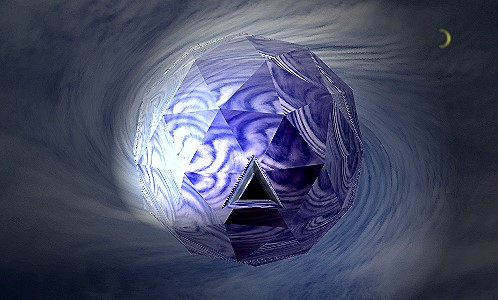
Art by Melissa Mead
The Cloud Dragon Ate Red Balloons
by Tom Cardamone
The cloud dragon ate red balloons and was angry. That a beast of his stature should have to rend paltry rubber when soccer fields everywhere rolled with earnest boys... the dragon itself roiled in anguish. His very substance was forever buoyed above the morsel heads he craved, perpetually positioned with an excellent view of the denied buffet--the cloud dragon would hover over playgrounds and eviscerate himself into a thousand white feathers as blithe boys monkeyed on swings, obliviously competing to place their sandy toes within his ephemeral jaws. The wispy shards of his being would scatter in frustration to reconvene elsewhere, someplace principled and resolutely unpeopled, usually far above frosty seas or sober Alps. High in the stratosphere the cloud dragon would assemble the shifting flakes of his scales. Drifting back toward land, coiling and uncoiling the mist of his long, reptilian shape in mute hostility, whiskers steaming, the dragon wished again for the weight of silver teeth.

Most species of dragons had retired or, mistaken for dinosaurs, collectively hung their bones in museums, waiting in the wings for just the right time to reemerge, to scorch schools and char church parking lots. But cloud dragons were a harried lot. They were the first to drift away from the mind of the world. The tales that gave them ballast were forgotten, their untended shrines in remote Hokkaido had gone back to the earth. No one burned the incense that stroked their spines and blackened their brows. This particular cloud dragon had not met another of his race in centuries. As far as he knew, no other fantastical creatures combed the barren sky save the gargantuan cloud crustaceans. Miles long, the dragon steered clear of these lugubrious monstrosities; the gray rivets of their abdomens were a constant source of torrential rain. Rumored to possess their own vaporous ecosystems, containing clear koi fish that swam in the large pools of moisture which collected in the dimples of their shells, or snaky golden remoras that adhered to their bellies and flashed like distant lightning, he had never bothered to investigate. Their sizable pinchers made the otherwise impressive dragon feel like a wizened shrimp.
Japanese monks had deferentially joked with Western missionaries that cloud dragons were failed snow dragons that only had love for one another, never sharing their snow with Izanami, Mother Earth, and were thus unfettered, unproductive fantasies. The crawling pestilence of one religion consuming another was blight enough on the world, but that the monks had disparaged the cloud dragons to mask the guilt of their own nightly assignations had only hastened the exodus. Dragons of every rank and element abandoned the polluted islands just as they had previously divested the continents. They took to the oceans of the sky for convalescence.

The cloud dragon, separated from his scaly flock, unsure if others still existed, directed his appetite toward the perky orbs of school boys on lonely country roads, delivering newspapers as dawn cracked its pink egg on the bowl of the horizon. The boys, in turn, mistook his seething drool for April showers.



